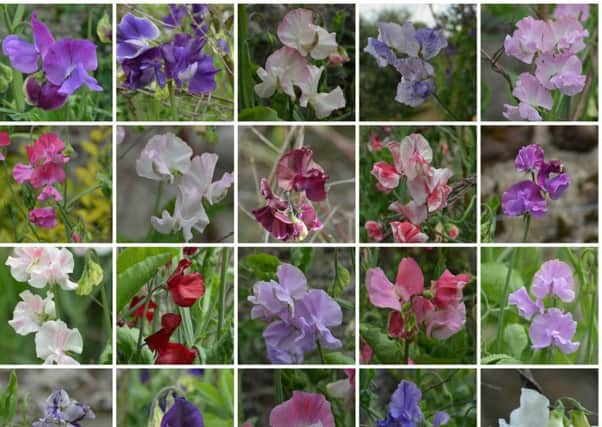Sweet pea garden trial at Parham


He hails from RHS Wisley, where he was involved with the Portsmouth trial fields, and he has continued his interest with plant trialling at Parham ever since.
In 2015, it was sunflowers and pumpkins; this year it’s tulips, alliums and sweet peas.
Advertisement
Hide AdAdvertisement
Hide AdThese charming annuals were chosen for this year as they are unique among garden flowers with their vivid colours, fragrance, and length of bloom in the garden and are ideal for the traditional flower arrangements in the House.
The flowers have an air of romance about them in both their scent and appearance, which works well with the romanticism that is emulated throughout Parham’s Gardens.
Sweet peas have a fascinating history. It is generally believed that the first sweet pea seeds were harvested from the wild by a monk living on the island of Sicily and sent to an English schoolmaster in 1699.
In the mid 1880’s, a Scotsman named Henry Eckford began hybridizing and selecting sweet peas, introducing much larger, more beautifully formed varieties with a wider range of colours.
Advertisement
Hide AdAdvertisement
Hide AdThese ‘grandifloras’ became very successful commercially as cut flowers and were widely grown by horticulturists for exhibition.
At the turn of the 20th century (in 1901) the most celebrated new form of sweet pea was discovered as a natural mutation in the gardens of the Earl of Spencer.
This Spencer type, as they came to be known, had much larger, wonderfully ruffled upper or “ standard” petals, longer lower “wing” petals and much showier blossoms overall.
During 2016 Tom and the team have been working closely with Roger Parsons, who manages the National Collection of Lathyrus (sweet peas) in Chichester. Roger has selected his favourite and best 50 varieties for use as cut flowers and the team are now growing them all at Parham.
Advertisement
Hide AdAdvertisement
Hide AdIn February of this year the seeds were sown in the greenhouses in Parham’s own nursery.
Lovingly nurtured from then until the end of March, they were then planted outside in the Walled Gardens.
As you know, sweet peas require something to climb; to give them a decorative frame, 300 stems of silver birch were harvested from the Parham Estate.
These were used to sculpt a woven obelisk for each variety to grow over. From the middle of June onwards the beautiful flowers will be constantly cut to assess which ones are the team’s favourites to use in the many cut flower arrangements throughout the House.
Advertisement
Hide AdAdvertisement
Hide AdDepending on how each of them performs, the favourite varieties will be selected to grow in the Garden in the future.
The favourite sunflowers from the 2015 trial are now being grown adjacent to the Glasshouse, along with some of the pumpkins and squashes we consider to be the best!
Tom will be conducting an informal talk ‘Success With Sweet Peas’ as part of our Parham Garden Weekend event on Saturday July 9 and Sunday July 10 at 2pm on both days.
The Garden Weekend is Parham’s flagship event, showcasing high-quality specialist nurseries.
Advertisement
Hide AdAdvertisement
Hide AdIt is also one of the best garden weekends in the South East of England for viewing and buying really top quality plants.
Please let the Parham team know your favourite sweet pea, either via Facebook, Twitter, Instagram or in person.
Freshly picked posies of each sweet pea variety are displayed in the Plant Shop, along with seeds, so you can easily identify your favourite to grow at home.
The House & Gardens are open on Wednesdays, Thursdays, Fridays, Sundays and Bank Holidays until the end of September.
Advertisement
Hide AdAdvertisement
Hide AdParham Garden Weekend is onSaturday July 9 and Sunday July 10 from 10:30am – 5pm.
Admission can be booked in advance on the Parham website, where a 10% discount is offered as well as fast track entry on event days.
Please book via www.parhaminsussex.co.uk
For further information on the event please visit the website or telephone the Estate Office on 01903-742021 or email: [email protected]